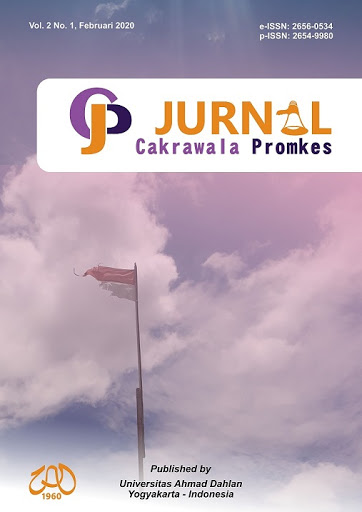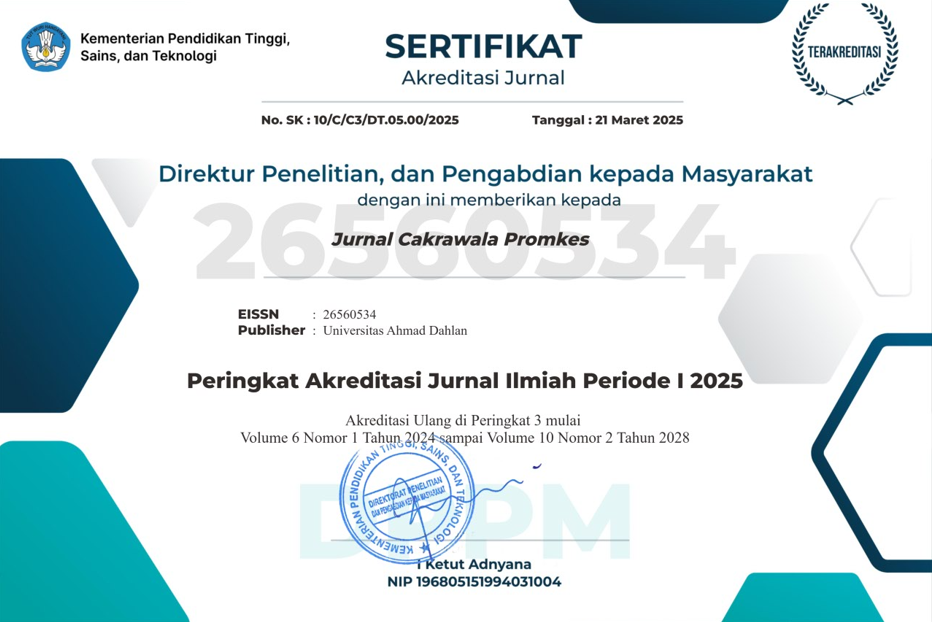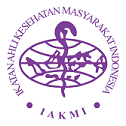Stigma terhadap pasien pasca COVID-19 dan faktor yang mempengaruhinya
DOI:
https://doi.org/10.12928/promkes.v3i2.4712Keywords:
Stigma patient Post-COVID, Knowledge, Attitude, The role of community leadersAbstract
Stigma is a negative action that can reduce a person’s self-confidence. During the COVID-19 pandemic, the stigma can be in the form of refusal of bodies, expulsion of medical staff or ex-communication of patients with confirmed COVID-19 and post-COVID-19 patients. There are 2 Post-COVID-19 patients in Papringan Hamlet. This study aims to find out the influence of knowledge, attitudes, and role of community leaders on the stigma against Post-COVID-19 patients in Papringan Helmet Sidomukti Magetan Regency. This was a cross-sectional study. The population were the people who live in Papringan Hamlet, the sample amount was 97 respondents who used the Slovin formula. The sample criteria were aged 26-45 years, chosen by purposive sampling technique. Data were collected by questionnaires and checklist observations. Data analysis used the logistic regression test. Results: The results of the bivariate analysis test showed that there was an influence a relationship between knowledge (Sig. 0,000), attitude (Sig. 0,000), and roles of community leaders (Sig. 0,000) on the stigma against post-COVID-19 patients and multivariate analysis using Binary logistic test indicated there is an influence of knowledge (OR=16,955) to stigma Post-COVID-19 patients in Papringan Hamlet Sidomukti Magetan Regency. The Health Service and community health centres can eliminate the stigma of Post-COVID-19 patients in the community by increasing public knowledge through health education, as well as encouraging the role of religious leaders and community leaders to influence public attitudes so as not to carry out negative stigma against Post-COVID patients.
References
2. Putranto dr TA. Kemenkes Kenalkan Istilah Probable, Suspect, Kontak Erat dan Terkonfirmasi COVID-19 [Internet]. Sehat Negeriku. 2020. Available from: http://sehatnegeriku.kemkes.go.id/baca/rilis-media/20200714/2834469/kemenkes-kenalkan-istilah-probable-suspect-kontak-erat-dan-terkonfirmasi-covid-19/
3. Fadli F, Safruddin S, Ahmad AS, Sumbara S, Baharuddin R. Faktor yang Mempengaruhi Kecemasan pada Tenaga Kesehatan Dalam Upaya Pencegahan Covid-19. J Pendidik Keperawatan Indones. 2020;6(1):57–65.
4. Dinas Kesehatan Daerah Istimewa Yogyakarta. Arti Dibalik Nama Covid 19 [Internet]. DINAS KESEHATAN DAERAH ISTIMEWA YOGYAKARTA. 2020 [cited 2021 Jan 9]. Available from: https://www.dinkes.jogjaprov.go.id/berita/detail/arti-dibalik-nama-covid-19-2
5. WHO. Coronavirus Disease (COVID-19) [Internet]. WHO. 2020 [cited 2020 Dec 24]. Available from: https://covid19.who.int/
6. Kementerian Kesehatan. Pertanyaan dan Jawaban Terkait COVID-19 Kementerian Kesehatan [Internet]. KEMKES. 2020 [cited 2021 Jan 9]. Available from: https://www.kemkes.go.id/article/view/20030400008/FAQ-Coronavirus.html
7. Dinas Kesehatan Kabupaten Magetan. COVID-19 [Internet]. 2020. Available from: https://covid19.magetan.go.id/
8. Ardani I, Handayani S. Stigma terhadap Orang dengan HIV/AIDS (ODHA) sebagai Hambatan Pencarian Pengobatan: Studi Kasus pada Pecandu Narkoba Suntik di Jakarta. Bul Penelit Kesehat. 2017;45(2):81–8.
9. Saprudin A, Heriana C, Jatiningsih S. Pengetahuan dan Sikap Stigma Mahasiswa Kebidanan STIKES KUNINGAN Terhadap Orang Dengan HIV/AIDS (ODHA). J Ilmu-ilmu Kesehat Bhakti Husada Kuningan. 2015;4(2):22–5.
10. Puspita A, Hayati F, Fuadah DZ. Stigma Masyarakat Terhadap Orang Dengan Hiv Aids (Odha). J Ilmu Kesehat. 2017;8(2):151–9.
11. Wulandari ISM, Namah I. Penyuluhan Kesehatan Tentang Hiv/Aids Terhadap Pengetahuan Dan Sikap Pada Siswa Sma Negeri Parongpong Desa Cihanjuang Kecamatan Bandung Barat. J Sk Keperawatan. 2019;5(1):56–62.
12. Martiningsih, Abdul H, Ade W. Stigma Petugas Kesehatan Terhadap Pasien Hiv/Aids Dan Problem Solving. J Kesehat Prima. 2015;I(2):1471–7.
13. Abudi R, Mokodompis Y, Magulili AN. Stigma Terhadap Orang Positif Covid-19. Jambura J Heal Sci Res. 2020;2(2):77–84.
14. Garamina HJ. Hubungan Pengetahuan dan Sikap Masyarakat Terhadap Stigma Penyakit. J Aromed Unila. 2015;2(3):326–32.
15. Yani F, Harahap FSD, Hadi AJ. Stigma Masyarakat Terhadap Orang Dengan HIV/AIDS (ODHA) Di Kabupaten Aceh Utara. MPPKI (Media Publ Promosi Kesehat Indones Indones J Heal Promot. 2020;3(1):56–62.
16. Nirindah R, Prastiwi W, Studi P, Masyarakat K, Kesehatan FI, Surakarta UM. Hubungan Pengetahuan, Sikap dan Persepsi Anggota WPA Tentang HIV/ AIDS dengan Stigma Pada ODHA di Surakarta. 2019;hal 1,5,7.
17. Maharani F. Faktor -Faktor Yang Berhubungan Dengan Stigma Terhadap Orang Dengan Hiv Dan Aids (Odha). J Endur. 2017;2(2):158.
18. Latifa A, Purwaningsih SS. PERAN MASYARAKAT MADANI DALAM MENGURANGI STIGMA DAN DISKRIMINASI TERHADAP PENDERITA HIV & AIDS. J Kependud Indones. 2016;6(2):51–76.
19. Rosidin U, Rahayuwati L, Herawati E. Perilaku dan Peran Tokoh Masyarakat dalam Pencegahan dan Penanggulangan Pandemi Covid -19 di Desa Jayaraga, Kabupaten Garut. Umbara. 2020;5(1):42.
20. Rembang, Prisilia. Lasut, J. Kandowangko N. PERANAN TOKOH MASYARAKAT DALAM PENANGANAN MASALAH SENGKETA TANAH DI DESA SULU KECAMATAN TATAPAAN KABUPATEN MINAHASA SELATAN. 2018;(21).
21. Salamah A, Harmanto. PERAN TOKOH MASYARAKAT DALAM MENGUNGKAP KASUS KORUPSI STUDI KASUS DESA PLOSO KECAMATAN KREMBUNG KABUPATEN SIDOARJO. Kaji Moral dan Kewarganegaraan. 2019;1204025403:723–37.
Downloads
Published
Issue
Section
License
Authors who publish with JCP: Jurnal Cakrawala Promkes agree to the following terms:
- Authors retain copyright and grant the journal the right of first publication with the work simultaneously licensed under a Creative Commons Attribution License (CC BY-SA 4.0) that allows others to share the work with an acknowledgement of the work's authorship and initial publication in this journal.
- Authors are able to enter into separate, additional contractual arrangements for the non-exclusive distribution of the journal's published version of the work (e.g., post it to an institutional repository or publish it in a book), with an acknowledgement of its initial publication in this journal.
- Authors are permitted and encouraged to post their work online (e.g., in institutional repositories or on their website) prior to and during the submission process, as it can lead to productive exchanges, as well as earlier and greater citation of published work.

This work is licensed under a Creative Commons Attribution-ShareAlike 4.0 International License












